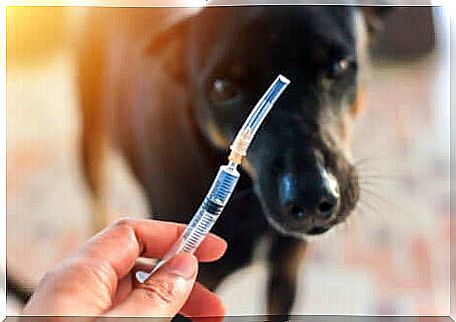What Are The Basic Vaccines For Dogs?

Vaccinating the dog is the most effective way to prevent the various diseases that can affect our four-legged friends. This is a safe method with very low chances of causing side effects. Read on to find out which vaccines are essential for dogs!
During the first visit, the vet himself will give you all the information on the vaccination cycle for your dog or cat. All the basic vaccines for dogs against the most common or serious diseases will be included in the calendar.
What to do before vaccinating the dog?
Newborn puppies acquire immunity through breastfeeding and colostrum (the first mother’s milk). For this reason it is important not to separate the puppies from the mother before time. This, in addition to the risk of developing pathologies, would lead to behavior problems related to premature separation from the litter.
At around six weeks, maternal immunity ends and the puppies are ready for adoption, between the sixth and eighth week of life. From now on, the puppy’s health is in the owner’s hands.

It is recommended to start the vaccination course when the dog is small. Even better before the puppy enters the house, to avoid infecting the other members of the house with any pathogens still in the incubation phase.
Infectious diseases have an incubation period that lasts from when the pathogen enters the organism until the first symptoms appear. This does not mean that in this first phase the carrier is not contagious.
During this time, the microorganism that causes the disease multiplies and is released from the body through urine, feces and mucus. This is the main time when the disease can be infected, so it is important to be cautious before introducing the new puppy to the other pets living in the house.
For the vaccine to be as effective as possible, the dog must be healthy and free from parasites. Infections caused by worms are for example common in dogs that do not undergo this process.
The basic vaccines for dogs
Veterinary centers provide different types of vaccines, but the most common and almost always present in the vaccination calendar are the following:
- Distemper
- Parvo
- Hepatitis
- Leptospirosis
- Anger
- Leishmaniasis
- Infectious tracheobronchitis (or kennel cough)
The top five are by far the most common diseases and the ones that could put your puppy’s life most at risk. This is why vaccines against them are considered essential for dogs.
The vaccine against leishmaniasis is recommended if the dog lives in areas with a high presence of sand flies or sand flies, while the risk of infectious tracheobronchitis occurs if the dog lives in close contact with many other specimens, for example in a kennel. .
The mandatory vaccines for dogs
Under Italian law, there are some mandatory vaccines for dogs. These are canine parvovirus, distemper, hepatitis, leptospirosis and rabies. Talk to your vet to find out all about the mandatory vaccine schedule.
When to start the cycle of basic vaccines for dogs
After the first six weeks of life it is already possible to start vaccinating the dog. The first basic vaccines for dogs are usually those against parvovirus and distemper, which require a second booster after three to six weeks.
In addition to these two, the dog will also be subjected to the hepatitis and leptospirosis vaccine. There is a single vaccine for both diseases, with an annual booster aimed at creating an immune response to the virus in the animal.
At three months of age, the puppy can be vaccinated against rabies. In this case the vaccine has an efficacy that lasts 21 days from the moment of inoculation. Depending on your country’s legislature, an annual recall may be mandatory.
The leishmaniasis vaccine can be done around six months and will need to be combined with the use of an external pesticide to prevent insect bites as well as leishmania development. The antibodies generated by the vaccine, in fact, act when the parasite has already managed to penetrate the body.

Why is it important to vaccinate?
Vaccines for dogs are administered via a subcutaneous puncture, except for infectious tracheobronchitis, which is administered intranasally. They are painless for the animal and guarantee a very high probability of eradicating the disease they are aimed at.
In order for the vaccine to be successful, it is always recommended to follow the instructions of your veterinarian, respect the vaccination schedule and carry out all the necessary boosters, so as to guarantee your dog the right number of antibodies.









